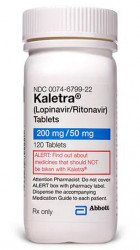Kaletra Coupons, Discounts & Cost
Kaletra is an antiviral drug used in HIV therapy. One way to save money on the Kaletra (lopinavir/ritonavir) retail cost regardless of income and insurance status is to use Kaletra coupons or discount cards from RXCoupons. Use our Lopinavir and Ritonavir coupons at your online pharmacy and receive up to 75% off the sale price each time you refill your prescription.
What is Kaletra?
Kaletra is an antiviral drug used in HIV therapy. Kaletra contains lopinavir and ritonavir.
Lopinavir belongs to the group of inhibitors of the HIV-1 and HIV-2 proteases. Lopinavir prevents the synthesis of viral proteins.
Ritonavir inhibits the metabolism of lopinavir and works by increasing levels of lopinavir.
Kaletra is used in combination therapy of human immunodeficiency virus (HIV) in adults and children.
Kaletra contraindications
Kaletra is not used in patients with severe hepatic impairment and hypersensitivity to the drug. The drug should not be combined with voriconazole, terfenadine, astemizole, triazolam, midazolam, cisapride, ergot alkaloids (e.g., ergometrine and methylergometrine, ergotamine and dihydroergotamine), pimozide, lovastatin, St. John's wort products, simvastatin, rifampicin.
Caution is recommended in patients with liver cirrhosis, viral hepatitis B and C, mild to moderate hepatic insufficiency, elevated liver enzymes, hemophilia A and B, dyslipidemia (including hypercholesterolemia, hypertriglyceridemia), as well as in patients older than 65 years.
Kaletra can be used during pregnancy if the expected benefits outweigh the potential risk to the fetus and the mother. Do not use Kaletra oral solution in infants up to 6 months. Do not use Kaletra tablets in children under the age of 3.
Kaletra instructions for use
Tablets should be swallowed (do not crush or chew) regardless of the meal. The recommended dosage for adults: 400/100 mg twice daily or 800/200 mg 1 time a day for patients who have not received antiretroviral therapy. If you suspect a decline in the patient's susceptibility to lopinavir, it is necessary to increase the dose to 500/125 mg in combination with nevirapine, efavirenz, nelfinavir or amprenavir. The recommended dosage for children weighing more than 35 kg is 400/100 mg 2 times a day (without nevirapine, efavirenz, nelfinavir or amprenavir).
The recommended dosage for oral solution for adults: 5 ml 2 times a day or 10 ml once daily for patients not previously treated with anti-retroviral drugs. If you suspect a decline in the patient's susceptibility to lopinavir, it is recommended to increase the dose of Kaletra to 6.5 ml 2 times daily in combination with efavirenz or nevirapine. The recommended dosage for children is determined by the physician (it depends on the drug combination, sensitivity to lopinavir, weight and age of the child). The daily dose for children weighing more than 40 kg should not exceed 5 ml 2 times a day.
Adults taking nevirapine, efavirenz, nelfinavir, amprenavir should not take Kaletra 1 time per day.
Kaletra possible side effects
Side effects have more than 2% of adult patients. General disorders: fever, fatigue, chills. Digestive system: diarrhea, abdominal pain, dyspepsia, nausea, flatulence, vomiting, dysphagia. Nervous system: insomnia, headache, paresthesia. Cardiovascular system: hypertension, vascular disorders. Psychiatric disorders: depression, decreased libido. Skin and subcutaneous tissue: rash, lipodystrophy. Metabolism and nutrition disorders: decreased body weight, anorexia. Musculoskeletal system: myalgia. Infections: bronchitis. Endocrine system: amenorrhea, hypogonadism (in men). Some adult patients (less than 2%) have the following side effects: General disorders: discomfort, pain in the chest, edema. Metabolism: dehydration, vitamin deficiency, diabetes, lactic acidosis, increased appetite, weight gain, obesity. Lymphatic system and blood: leukopenia, anemia, lymphadenopathy. Cardiovascular system: atrial fibrillation, deep vein thrombosis, myocardial infarction, orthostatic hypotension, vasculitis, thrombophlebitis. Liver and biliary tract: cholecystitis, cholangitis, hepatitis, hepatomegaly, jaundice, liver function disorders. Infections: furunculosis, flu syndrome, gastroenteritis, otitis media, bacterial infections, pharyngitis, sinusitis, sialadenitis. Immune system: allergic reactions. Endocrine system: hypothyroidism, Cushing's syndrome. Nervous system: dizziness, drowsiness, neuropathy, amnesia, cerebral infarction, ataxia, seizures, encephalopathy, dyskinesia, extrapyramidal syndrome, tremors, facial paralysis, peripheral neuritis, migraine. Psychiatric disorders: anxiety, insomnia, lethargy, agitation, confusion, nervousness, emotional lability, abnormal thinking. Respiratory system: dyspnea, asthma, rhinitis, cough, pulmonary edema. Digestive system: dry mouth, constipation, enterocolitis, enteritis, esophagitis, gastritis, bowel incontinence, hemorrhagic colitis, stomatitis and ulcerative stomatitis, periodontitis, pancreatitis. Skin and subcutaneous tissue: skin dryness, itching, alopecia, acne, eczema, swelling of the face, exfoliative dermatitis, maculopapular rash, seborrhea, skin ulcer, sweating. Kidney and urinary tract: nephritis, kidney stones. Reproductive system: impotence, gynecomastia, breast enlargement, ejaculation disorders. Musculoskeletal system: back pain, muscle weakness, arthralgia, arthritis.
Kaletra Special instructions
Kaletra is used with extreme caution with any intranasal and inhaled glucocorticosteroids (GCS), as there is a high risk of systemic side effects.
When combined with tadalafil, vardenafil or sildenafil, Kaletra may lead to hypotension and prolonged erections.
The concentration of the active ingredients of the drug is higher in patients with functional hepatic impairment.
Patients should consult a doctor in case of stiffness and pain in the joints, as these symptoms may be associated with the development of osteonecrosis.
Kaletra should be used with caution in patients older than 65 years.

